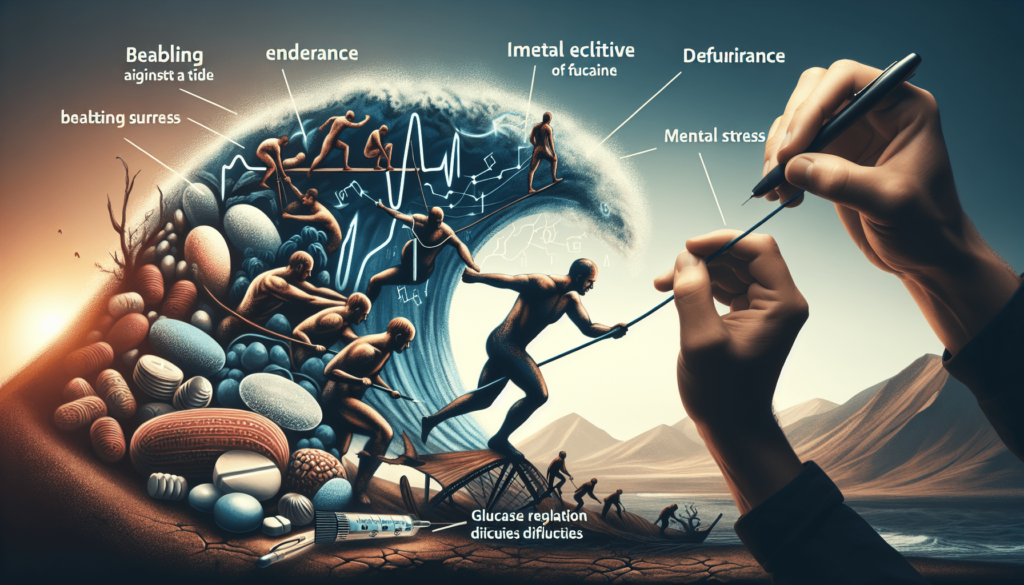Living with diabetes can be challenging, especially for women who experience the additional burden of managing diabetes-related fatigue. This article aims to shed light on the impact of fatigue on daily life and provide practical strategies to help you better manage this aspect of your health. By understanding the causes of fatigue and implementing effective coping mechanisms, you can regain control over your energy levels and enjoy a more fulfilling and productive life. Let’s explore how to effectively manage diabetes-related fatigue and its effects on your daily life.
In This Article
ToggleUnderstanding Diabetes-Related Fatigue
What is diabetes-related fatigue?
Diabetes-related fatigue refers to a persistent and overwhelming sense of tiredness and lack of energy experienced by individuals with diabetes. It is a common symptom of both type 1 and type 2 diabetes and can significantly impact daily life. People with diabetes often find themselves feeling excessively tired, lacking energy for their usual activities, and experiencing difficulties in concentration. It is important to understand the causes and prevalence of diabetes-related fatigue in order to effectively manage and minimize its effects.
Causes of diabetes-related fatigue
There are several factors that contribute to diabetes-related fatigue. One of the primary causes is fluctuations in blood sugar levels. When blood sugar levels are too low or too high, it can lead to feelings of fatigue and exhaustion. Additionally, diabetes-related complications such as nerve damage, kidney problems, and sleep disturbances can also contribute to fatigue. The body’s inability to effectively use glucose for energy due to insulin resistance is another common cause. Other factors that can contribute to fatigue include stress, hormonal imbalances, and medication side effects.
How common is diabetes-related fatigue?
Diabetes-related fatigue is a prevalent issue among individuals with diabetes. Studies have shown that up to 85% of people with diabetes report experiencing fatigue as a regular symptom. The exact prevalence may vary depending on factors such as the type of diabetes, age, overall health, and adherence to diabetes management strategies. Regardless of the specific numbers, it is clear that diabetes-related fatigue is a common and significant concern for many individuals living with diabetes.
Signs and Symptoms of Diabetes-Related Fatigue
Excessive tiredness and exhaustion
Individuals with diabetes-related fatigue often experience persistent feelings of tiredness and exhaustion, regardless of the amount of rest they get. Even after a full night’s sleep, they may wake up feeling fatigued and lacking energy. This excessive tiredness can make it challenging to engage in normal daily activities and can significantly impact overall quality of life.
Lack of energy for daily activities
One of the hallmark signs of diabetes-related fatigue is a lack of energy to complete daily tasks and activities. Simple activities that were once effortless may now feel extremely challenging. Individuals may find themselves unable to participate in physical activities they previously enjoyed, such as exercise or hobbies, due to a lack of energy.
Difficulty in concentrating and brain fog
Diabetes-related fatigue can also affect cognitive function, leading to difficulties in concentration and mental clarity. Many individuals report experiencing “brain fog,” a state of mental confusion and slowed thinking. This can make it challenging to focus at work or school and can impact overall productivity and performance.
Muscle weakness and reduced stamina
Muscle weakness and reduced stamina are common symptoms of diabetes-related fatigue. Individuals may find that tasks that used to require minimal effort now feel physically exhausting. Even simple activities like climbing stairs or carrying groceries become more challenging. This muscle weakness and reduced stamina can further contribute to feelings of fatigue and exhaustion.

This image is property of images.pexels.com.
Effects of Diabetes-Related Fatigue on Daily Life
Impact on work or job performance
Diabetes-related fatigue can have a significant impact on an individual’s ability to perform well at work or school. The persistent lack of energy and difficulties in concentration can make it challenging to complete tasks efficiently and effectively. Meeting deadlines, staying focused in meetings or classes, and maintaining productivity can become increasingly difficult.
Disruption of daily routines and activities
Fatigue can disrupt daily routines and activities that were once enjoyable and fulfilling. Individuals may find themselves needing to rest more frequently or take breaks throughout the day, which can interrupt their ability to engage in work, social, or personal activities. This disruption can lead to frustration, decreased motivation, and a sense of loss regarding the ability to lead a normal life.
Limitations in physical and social activities
Diabetes-related fatigue can limit an individual’s ability to engage in physical and social activities. Exercise and recreational activities may become challenging or impossible due to the lack of energy and muscle weakness. Socializing with friends and family may also be impacted, as individuals may feel too tired to participate in social events or gatherings. This can lead to feelings of isolation and decreased overall quality of life.
Emotional and psychological effects
Living with diabetes-related fatigue can have emotional and psychological impacts on individuals. The constant fatigue and limitations in daily activities can lead to feelings of frustration, irritability, and sadness. It is common for individuals to experience emotional ups and downs, as the fatigue can make it difficult to fully participate in and enjoy life. It is important to address these emotional and psychological effects along with the physical aspects of fatigue.
Managing Diabetes-Related Fatigue
Maintaining blood sugar levels
One of the key strategies in managing diabetes-related fatigue is maintaining stable blood sugar levels. This can be achieved through regular monitoring of blood glucose levels and adherence to a diabetes management plan. It is important to work closely with a healthcare professional to develop an individualized plan that includes regular blood sugar testing, appropriate medication or insulin management, and lifestyle modifications to keep blood sugar levels within a target range.
Balancing diet and nutrition
Proper nutrition plays a vital role in managing diabetes-related fatigue. It is important to eat a well-balanced diet that includes a variety of nutrient-rich foods. Focus on consuming complex carbohydrates, lean proteins, and healthy fats while limiting sugary and processed foods. Regular meal times, portion control, and mindful eating can help stabilize blood sugar levels and provide sustained energy throughout the day.
Engaging in regular exercise
Although fatigue can make exercise feel challenging, regular physical activity is important for managing diabetes-related fatigue. Exercise helps improve insulin sensitivity, reduce stress levels, and boost energy levels. Start with low-impact activities such as walking, swimming, or cycling, and gradually increase duration and intensity. It is essential to consult with a healthcare professional before starting any exercise routine and to adjust accordingly based on individual energy levels.
Getting quality sleep and rest
Quality sleep and rest are essential for managing diabetes-related fatigue. Establish a regular sleep routine by going to bed and waking up at consistent times. Create a sleep-friendly environment by ensuring a comfortable mattress, minimizing noise and light disturbances, and limiting electronic device usage before bedtime. Incorporating relaxation techniques such as deep breathing, meditation, or gentle stretching before sleep can also promote better sleep quality.
Stress management techniques
Stress can exacerbate fatigue levels, so it is important to develop effective stress management techniques. Identify stress triggers and implement coping mechanisms such as deep breathing exercises, mindfulness meditation, or engaging in hobbies and activities that promote relaxation. Additionally, seeking support from friends, family, or support groups can provide emotional outlets and reduce stress levels.

This image is property of images.pexels.com.
Implementing Lifestyle Changes for Fatigue Management
Establishing a consistent daily routine
Establishing a consistent daily routine can help manage diabetes-related fatigue. This includes waking up and going to bed at consistent times, scheduling meals, medication, and exercise at regular intervals, and incorporating relaxation and rest periods throughout the day. A structured routine can provide a sense of stability and help manage energy levels more effectively.
Prioritizing rest and relaxation
Managing fatigue requires prioritizing rest and relaxation. It is important to listen to your body and take breaks or rest periods when needed. Schedule regular downtime to engage in activities that promote relaxation and rejuvenation, such as reading, taking a warm bath, or practicing a hobby. Prioritizing self-care is essential in managing diabetes-related fatigue.
Planning and pacing activities
Planning and pacing activities can prevent overexertion and conserve energy. Break down tasks into smaller, manageable steps and distribute them throughout the day. Avoid the temptation to push through exhaustion and pace yourself to prevent worsening fatigue. Setting realistic goals and expectations can help create a more manageable schedule and lessen the impact of fatigue.
Utilizing assistive devices and technology
Assistive devices and technology can be helpful in managing fatigue. Consider using aids such as walking aids, mobility carts, or ergonomic tools to minimize physical strain and conserve energy. Utilize smartphone apps or wearable devices to track blood sugar levels, monitor physical activity, and receive reminders for medication or meal times. These tools can help streamline daily routines and reduce the cognitive demands associated with managing diabetes.
Seeking support from healthcare professionals
Relying on the expertise of healthcare professionals is crucial in managing diabetes-related fatigue. Regular check-ups and monitoring are essential to assess overall health and adjust treatment plans as needed. Working closely with diabetes specialists, such as endocrinologists or diabetes educators, can provide valuable guidance and support. Consulting with dietitians or nutritionists can help develop customized meal plans to optimize energy levels. Additionally, exploring medication and treatment options can be beneficial in managing symptoms and improving overall quality of life.
Coping Strategies for Diabetes-Related Fatigue
Educating oneself about diabetes and fatigue
Educating oneself about diabetes and fatigue is empowering and can provide a better understanding of the condition. Stay up-to-date with reputable sources of information, attend educational workshops, or participate in online forums to gain insights from others who have experienced similar challenges. Knowledge is key in effectively managing and coping with diabetes-related fatigue.
Setting realistic goals and expectations
Setting realistic goals and expectations is important for managing fatigue. Recognize that there may be limitations due to fatigue and adjust goals accordingly. Break tasks into smaller, more manageable steps to prevent becoming overwhelmed. Celebrate even the smallest achievements and progress, as this can boost motivation and overall well-being.
Practicing self-care and self-compassion
Practicing self-care and self-compassion is essential in managing diabetes-related fatigue. Prioritize activities that promote physical, mental, and emotional well-being, such as taking time for leisure activities, engaging in hobbies, or engaging in relaxation techniques. Be kind to yourself and acknowledge that fatigue is a valid and challenging symptom to navigate. Remember to listen to your body’s cues and give yourself permission to rest when needed.
Managing stress and emotional well-being
Managing stress and emotional well-being is vital in coping with diabetes-related fatigue. Explore stress management techniques such as deep breathing exercises, mindfulness meditation, or engaging in activities that bring joy. Seek emotional support from friends, family, or support groups to share experiences and coping strategies. Consider engaging in counseling or therapy to address any underlying emotional concerns related to fatigue and diabetes.
Engaging in enjoyable and rejuvenating activities
Engaging in enjoyable and rejuvenating activities can improve overall well-being and help combat fatigue. Find activities that bring joy and ignite passion, whether it be taking a walk in nature, listening to music, practicing a creative outlet, or spending quality time with loved ones. Engaging in activities that uplift the spirit can provide a sense of fulfillment and help manage the emotional toll of fatigue.

This image is property of images.pexels.com.
Seeking Support from Healthcare Professionals
Regular check-ups and monitoring
Regular check-ups and monitoring are vital in managing diabetes-related fatigue. These appointments allow healthcare professionals to assess overall health, monitor blood sugar levels, and make any necessary adjustments to the management plan. Regular monitoring provides an opportunity to detect any potential complications or underlying factors contributing to fatigue.
Working with diabetes specialists
Working closely with diabetes specialists, such as endocrinologists or diabetes educators, can provide valuable guidance and support in managing diabetes-related fatigue. These professionals have specific expertise in the field of diabetes and can help develop personalized management plans tailored to individual needs. They can also provide resources and education to help navigate the challenges of fatigue.
Consulting with dietitians and nutritionists
Consulting with dietitians or nutritionists can be beneficial in managing diabetes-related fatigue. These professionals can assist in developing individualized meal plans that optimize energy levels and support overall health. They can offer guidance on balancing macronutrients, portion control, and managing blood sugar levels through diet.
Exploring medication and treatment options
In some cases, medication and treatment options may be necessary to manage diabetes-related fatigue. It is important to discuss symptoms and concerns with a healthcare professional who can evaluate if any adjustments to current medication regimens are needed. There may be specific medications or treatments available to address underlying causes of fatigue or manage its symptoms.
Joining support groups or counseling
Joining support groups or participating in counseling can provide emotional support and a sense of community for individuals experiencing diabetes-related fatigue. Hearing others’ experiences, sharing coping strategies, and receiving validation from those who understand the challenges can be incredibly beneficial. Support groups can be in-person or online, and counseling can be individual or group-based, depending on personal preferences.
Tips for Communicating Fatigue to Others
Educating family, friends, and coworkers
Educating family, friends, and coworkers about diabetes-related fatigue is important to foster understanding and support. Share information about the condition, its symptoms, and how it impacts daily life. Explain that fatigue is not simply a matter of feeling tired but is a result of managing a chronic condition. Encourage open and honest communication to establish a support system that can accommodate and assist during periods of fatigue.
Setting boundaries and managing expectations
Setting boundaries and managing expectations are essential in communicating fatigue to others. Clearly communicate personal limitations and discuss realistic expectations for participation in social or work-related activities. It is important to prioritize self-care and not overextend oneself, even if it means declining invitations or delegating tasks. By setting boundaries, individuals can ensure energy is conserved for essential activities.
Explaining the impact of fatigue on daily life
Explaining the impact of fatigue on daily life can help others better understand the challenges faced. Describe how fatigue affects energy levels, physical ability, concentration, and overall well-being. Share specific examples of activities or tasks that are impacted by fatigue. This can provide a clearer picture of the challenges faced and foster empathy and support from others.
Seeking understanding and support
Seeking understanding and support from those around you is crucial in managing diabetes-related fatigue. Express the need for empathy, patience, and support during times of fatigue. Encourage open dialogue and create a safe space for loved ones to ask questions or offer assistance. By seeking understanding and support, individuals can build strong relationships and gain the assistance they need to manage fatigue effectively.

Improving Quality of Life with Diabetes-Related Fatigue
Pacing oneself and avoiding overexertion
Pacing oneself and avoiding overexertion is vital to improving the quality of life when living with diabetes-related fatigue. Recognize personal energy limits and adjust activities accordingly. Be mindful of the need to conserve energy throughout the day, prioritize essential tasks, and delegate when possible. By pacing oneself, individuals can optimize energy levels and reduce the impact of fatigue.
Incorporating relaxation techniques and stress reduction
Incorporating relaxation techniques and stress reduction strategies can significantly improve the overall well-being of individuals with diabetes-related fatigue. Consider practicing deep breathing exercises, meditation, yoga, or guided imagery to promote relaxation and reduce stress levels. Engaging in activities that bring joy and calmness, such as spending time in nature or practicing a hobby, can also contribute to overall relaxation.
Engaging in hobbies and activities that bring joy
Engaging in hobbies and activities that bring joy is essential in improving the quality of life with diabetes-related fatigue. Dedicate time to activities that uplift the spirit and bring happiness, whether it be art, music, gardening, or spending time with loved ones. Engaging in enjoyable activities can provide a sense of fulfillment and act as a source of motivation during periods of fatigue.
Finding a balance between rest and productivity
Finding a balance between rest and productivity is key to optimizing quality of life. While it is important to rest and prioritize self-care, it is also necessary to engage in activities that promote productivity and a sense of accomplishment. Establishing a routine that includes dedicated periods of rest and specific times for completing tasks can help ensure a healthy balance.
Celebrating achievements and progress
Celebrating achievements and progress, no matter how small, is crucial in improving quality of life with diabetes-related fatigue. Take time to acknowledge and celebrate personal milestones, whether it be successfully completing a task or reaching a specific goal. Recognize that managing fatigue can be challenging and that each step forward is an accomplishment worth celebrating.
Conclusion
Recognizing the challenges of diabetes-related fatigue is the first step towards effectively managing and minimizing its impact. By understanding the causes and prevalence of fatigue, individuals with diabetes can develop strategies to cope and improve their overall quality of life. Implementing lifestyle changes, such as maintaining blood sugar levels, balancing diet and nutrition, engaging in regular exercise, getting quality sleep and rest, and managing stress, can significantly reduce fatigue levels. Seeking support from healthcare professionals, educating others about fatigue, and incorporating coping strategies into daily life can further empower individuals to lead fulfilling lives with diabetes. By taking proactive steps, individuals can minimize the effects of diabetes-related fatigue and embrace a life that remains vibrant and fulfilling.
Related posts:
 Revitalize Your Health with Our Magnetic Bracelet – The Ultimate Weight Loss and Anti-Fatigue Accessory for Arthritis and Carpal Tunnel Relief
Revitalize Your Health with Our Magnetic Bracelet – The Ultimate Weight Loss and Anti-Fatigue Accessory for Arthritis and Carpal Tunnel Relief
 Managing Diabetes and Reducing the Risk of Kidney Disease
Managing Diabetes and Reducing the Risk of Kidney Disease
 Managing Diabetes and Improving Sexual Health for Women
Managing Diabetes and Improving Sexual Health for Women
 Managing weight loss challenges with diabetes
Managing weight loss challenges with diabetes
 Managing Diabetes and Protecting Your Eye Health
Managing Diabetes and Protecting Your Eye Health
 Tips for Managing Blood Sugar Levels Effectively
Tips for Managing Blood Sugar Levels Effectively











No comment yet, add your voice below!